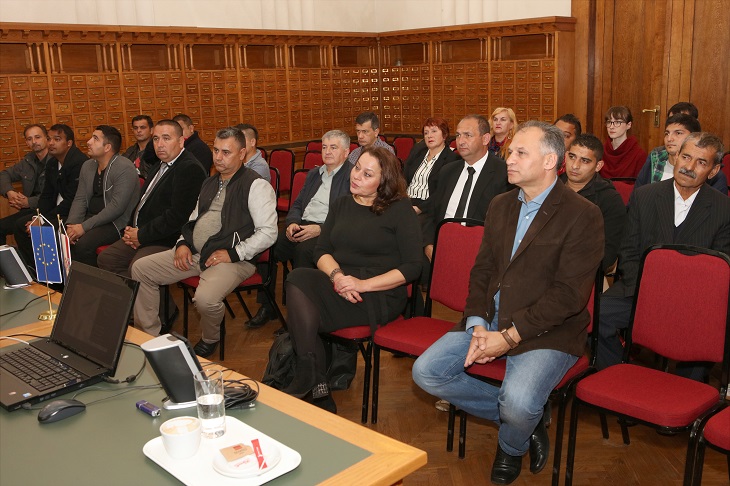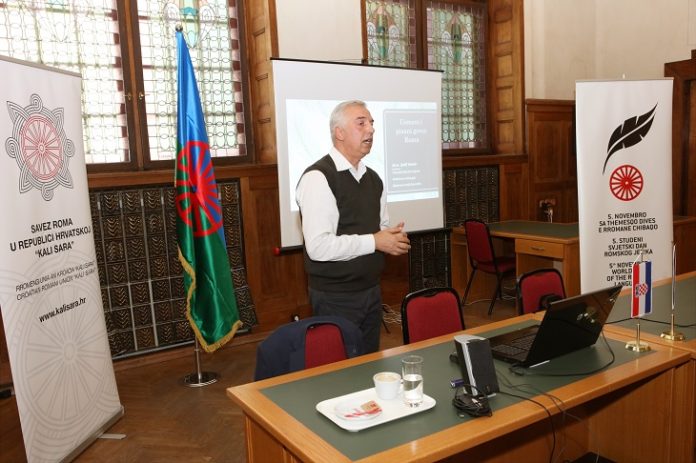Croatian State Archives hosted the lecture on the language and script of the Roma yesterday, 24th October, as an introduction to the international symposium to be held on Saturday, 4th November 2017, on Romani language and culture in exile in the late 20th century.
Croatian Romani Union “KALI SARA”, in co-operation with Veljko Kajtazi MP, for the ninth year in a row has organized the central celebration and international symposium on the occasion of the International Romani Day, to be held in Zagreb from 2nd to 5th November 2017.
Croatian State Archives hosted the lecture on the language and script of the Roma yesterday, 24th October, as an introduction to the international symposium to be held on Saturday, 4th November 2017, on Romani language and culture in exile in the late 20th century. The lecture was given by Professor Ljatif Demir, one of the founders of the Romani Studies launched within the Department of Indology and Far East Studies at the Faculty of Humanities and Social Studies in Zagreb. Professor Demir based his lecture on his own doctoral thesis “Literary and Linguistic Aspects of the Roma“.
Head of the Croatian State Archives, Dinko Čutura, welcomed the participants and emphasized that the Croatian State Archives building was designed by the greatest architect of Croatian Secession, Rudolf Lubinski and is considered to be the most beautiful building in Croatia and for some even the most beautiful in Europe. Rudolf Lubinski was a Jew, a member of national minority, and this fact speaks about the relevance of national minorities in creating Croatian identity and culture.
“If there is no language, collective memory, consciousness, identity – and that is what we preserve through language, then there are no peoples,” he added.

Veljko Kajtazi MP, encouraged the lecture and added that he had agreed with Mr. Čutura that the upcoming International Romani Day would be held in the Archives building. Professor Demir began his lecture with the information that in India (country of origin of the Roma people) it was embarrassing to write things down because the learned people, the erudite, would memorize everything. For Roma, as well as for other peoples, general characteristic of oral literature is its collective development, since more individuals participated in this development at different times and social conditions. Thus, the lecturer explained in his doctoral thesis the process of creating and developing Romani oral literature throughout certain periods.
Although the Roma suddenly converted from paganism to Christianity and Islam, their folk literature maintained pagan elements. Their oral literature was not Christianized and adapted to Christian perceptions, so these folk conceptions were condemned by the Christian Church. The Roma preserved them in their Mahalle (neighbourhoods). They managed to preserve them for a long time, because their literature was not written, as in other cultures, and Christianity had no influence on it. The largest number of the Roma came to this region during the Ottoman Empire, and the Ottomans did not allow written literature. Therefore, oral literature developed instead of the written, and the Romani oral literature experiencing a new blossom. Those Roma communities which lived a sedentary life in this region even before the arrival of the Turks, in the pre-feudal period, preserved their ancestral and tribal way of life as well as their tribal and family traditions cultivating their customs. Weakening of the Ottoman Empire caused the restoration of patriarchal social forms in the Romani Mahalles, where oral literature was still alive. It then reappeared in a new form. Best examples of Romani oral literature were created or obtained their final form then. That was so until the end of World War II.
Industrialization after the Second World War diminished the importance of storytelling in Romani Mahalles, making the Romani storytelling and singing apparently forgotten and lost, transformed into the unconscious part of Romani cultural memory.












